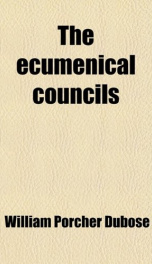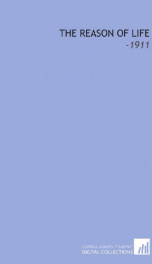the ecumenical councils

Purchase of this book includes free trial access to www.million-books.com where you can read more than a million books for free. This is an OCR edition with typos. Excerpt from book: The Organic Age of Christianity. 25 bility. Assume him to be what the church believes him, and the Scriptures, the thought and life of the church, the faith and formative principle of Christendom, become one, harmonious and comprehensible. The first movement, manifestation and self-embodiment of Christianity, as destined to be not merely an idea but a realization and an institution in the world, was certainly its most living, plastic and creative act. When this stage was at an end it was found to have formed for itself an outward expression of worship and life, an organization for discipline and government, and a body of sacred books that embodied its teaching. Confining ourselves to the latter we might say that the action of the church in accepting a canon of Scripture need not have been more than the instinctive and practical wisdom of receiving as highest, truest and best Christianity's own first, living and creative expression of itself, and making this the norm and measure of all subsequent self-expressions of it. It is self-evident to the mind that takes it in as a whole that the New Testament is a single movement of spiritual and Christian thought and life and that it is complete and sufficient in itself. It is equally certain that neither the succeeding nor any subsequent age had in it either the plastic capacity or the creative power to take for itself a living form such as Christianity easily, freely and naturally assumed in its initiative stage. And therefore it was, to say no more, an act of practical wisdom to accept that first embodiment and expression of itself as in principle at least and in substance final and irreform- able. In this way actually the church did adopt itsprimitive liturgical norm, its episcopal organization and its canon of Scripture. And sin...
Info about the book
Author:
Series:
Unknown
ISBN:
1570033471
Rating:
3/5 (3)Your rating:
0/5
Languge:
English
Users who have this book
Users who want this book
What readers are saying
What do you think? Write your own comment on this book!
write a commentGenre
if you like the ecumenical councils try:
Other books by this author
Do you want to read a book that interests you? It’s EASY!
Create an account and send a request for reading to other users on the Webpage of the book!



